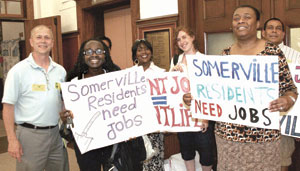
Members of the Somerville Community Corporation (SCC) are hoping that the “Local Hiring Ordinance” will soon be adopted and passed as official policy by the City of Somerville.- Photo by Andrew Firestone
By Andrew Firestone
While the local workers’ amendment to the Somerville Responsible Employer Ordinance may have been defeated in the DIF debate, its spirit lives on in the Alderman’s chambers. Concerned with the prospects of Somerville jobs for Somerville workers, members of the Somerville Community Corporation (SCC) urged the introduction of a new ordinance to guarantee local parity.
The ordinance has been championed by Ward 2 Alderwoman Maryann Heuston and Alderman-at-Large Bruce Desmond, who previously introduced the amendment in an effort to gain jobs on the future Assembly Square site, and other future developments.
The proposed ordinance, called the “Local Hiring Ordinance” mandates that any project receiving more than $50,000 in subsidy, be that through direct grants, tax breaks or otherwise, must employ Somerville residents 30 percent of their total work hours, 10 percent of hours be disadvantaged workers and 30 percent of all construction apprenticeship hours be local workers. This means all work hours for all employees.
As well, for all tenants of new constructions, 30 percent of available positions will be local. The Somerville Office of Strategic Planning and Community Development will set up a First Source Referral System to keep a list of qualified residents, provide job referrals and coordinate job training. They will also convene a liaison committee consisting of representatives from community groups, organized labor and workforce development agencies to monitor compliance.
Penalties for non-compliance of developers would include revocation of permits or even termination of contract.
“Somerville has 21,000 jobs in the city today,” said Danny LeBlanc, CEO of the SCC. “In the next twenty years, we’re going to nearly double that. There’s a lot of construction going on in Somerville.”
LeBlanc urged the aldermen to support the ordinance, saying that jobs for the many future construction projects, including Assembly Square and the development of the Inner Belt needed to be accessed by Somerville residents.
Assistant City Solicitor Matt Buckley wrote a dissenting legal opinion for the previous amendment, meant to coincide with the contract with Federal Reality Investment Trust. He says that while such an ordinance might work with fully publicly funded projects, “it is a well-settled law that such an ordinance as it applies to privately funded projects, including projects utilizing public funds, would violate the privileges and immunities clause… of the United States Constitution.”
He writes that in order to obtain substantial legal resolve, Somerville residents would have to prove underemployment in the City was due to solely to over competition with non-residents. “Since that would not be possible to demonstrate,” wrote Buckley, “the amendments the ordinance cannot pass constitutional muster.”
“This is worth fighting for not just in the Board of Aldermen but it’s worth fighting big challenges that come up after it’s passed,” said Desmond, acknowledging problems in the enforcing of such a law, “because it’s going to provide an awful lot to this community.” Desmond said that it was worth looking into such an issue, and the differences between ordinances might prove great enough for the ordinance to work.
“People that will be disenfranchised in some way will now have some access to jobs,” she said. “That’s what we’re looking for. Fair access to jobs that are here in the city”
“I made a commitment as chair of the Finance Committee that I would not see jobs discretion die,” said Heuston. “We will continue on and make sure that we can get something on the books here that we can at least begin some kind of goal towards getting local people local jobs.” Heuston said it was only fair that the community directly windfall from the “spillover effect” of major development in the City
LeBlanc’s non-profit, which is responsible for building the 3.5 acre Saint Polycarp Village on Mystic Ave., does not meet the standards of the proposed ordinance. The project, currently in the middle of three phases proposed to build 84 residential units of affordable housing and 6,200 sq. ft. of retail space upon completion, only uses 16 percent of local hires for it’s work in Phase II, and has received well above the $50,000 benchmark of public funding from the City, DHDC and HUD.
“While we have not yet achieved 30 percent, we have learned a lot about the intricacies of local hiring – how you achieve it, how you measure it,” LeBlanc said in a statement. “We believe we should be held to the same standard as other developers with respect to that question, and understand more than most the challenges of meeting such a standard.”
The ordinance will now undergo debate in the BOA Committee on Legislative Matters.













Reader Comments